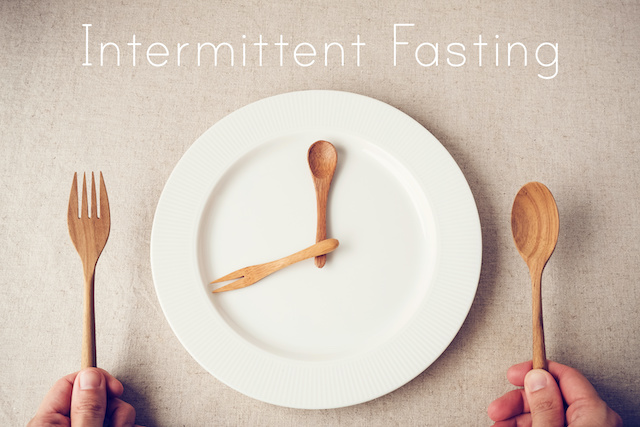Get the facts on intermittent fasting for safe weight loss and improved liver health
Intermittent fasting is a very popular way of eating that encourages weight loss, stable blood sugar levels, and healthy liver support. At its most basic, intermittent fasting is a way of eating with alternating periods of eating and multiple-hour fasts.
Many people who follow intermittent fasting realize a range of health benefits including weight loss, mental clarity, and increased energy. The word “fasting” does have a negative reputation, and this is why it’s super important to completely understand how to do intermittent fasting safely.
However, intermittent fasting is not for everyone. Please consult with your healthcare practitioner before you start an intermittent fasting program. Do not start intermittent fasting if you are underweight, have an eating disorder such as anorexia, are pregnant or breastfeeding, or under the age of 18. If you’re taking medication for diabetes or any other condition, please discuss this with your doctor before beginning intermittent fasting.
In this blog, I highlight everything I’ve learned about intermittent fasting. I want you to fully understand the facts on intermittent fasting so you can decide if you want to explore it further. Remember to subscribe to my mailing list for my latest articles, programs, and products about all things liver health, belly fat, intermittent fasting, and whole-body health.
What is intermittent fasting?
Intermittent fasting is an eating and lifestyle approach cycling between periods of eating and extended fasting. Intermittent fasting does not restrict the types of food you eat and drink.
Here are the key facts on intermittent fasting I want you to read and understand:
- Intermittent fasting is an eating pattern or style and is not a diet.
- There are many ways to do intermittent fasting. Popular approaches include 16-hour fasts or twice-weekly 24-hour fasts.
- After 12 hours of not eating, your body enters a fat burning state. This is why most intermittent fasting approaches recommend a minimum 12-hour fasted period.
- Fasting has been around for as long as humankind. The human body is capable of functioning without food for long time periods. Fasting is practiced for a range of spiritual and religious reasons.
- During periods of fasting your body changes at a cellular and molecular level. Some of these changes allow you to burn stored body fat and to repair cellular damage.
- Intermittent fasting does not place limits on the types of food and drink you consume. Depending on the type of intermittent fast you follow, you might consume a reduced calorie level for specific time periods.
- Intermittent fasting is not for everyone. Some people find they cannot adjust to the fasting periods. People who have an existing medical condition or take medication should consult their doctor before fasting.
One of the primary reasons people follow an intermittent fasting program is the minimal amount of change it requires to daily habits. Rather than forcing you to cut out entire food groups, eliminate sugar, or follow a regimented meal preparation plan, intermittent fasting simply requires you to change your eating patterns.
This approach to eating helps you change how your body processes stored body fat, regulates blood sugar and insulin, and takes the stress off of meal-planning. As an extra bonus, it’s easy to incorporate into a busy lifestyle involving raising kids (children under the age of 18 should not fast), traveling, working out, and socializing.
What are the health benefits of intermittent fasting?
When done safely and naturally, intermittent fasting has a wide range of health benefits including easy weight loss, natural liver cleansing, increased energy, and improved mental clarity.
These top five benefits of intermittent fasting, underscore why so many of you are reaching out to me with your questions about intermittent fasting:
- Easy to lose weight and belly fat. Dieting is hard. No one wants to feel restricted or to miss out on their favorite foods. Intermittent fasting works because it is not a diet. By skipping breakfast twice a week or only eating during an eight-hour time period, you kickstart your metabolism, regulate your blood sugar levels, and slowly but surely lose belly fat.
The Harvard T.H. Chan School of Public Health conducted a review of studies into the efficacy of intermittent fasting for weight loss and belly fat reduction, and concluded, “A systematic review of 40 studies found that intermittent fasting was effective for weight loss with a typical loss of 7-11 pounds over 10 weeks.”
- Improved liver health. Intermittent fasting has a trickle-down health benefit for your liver. Because your body uses stored fat for energy during fasted periods, your liver is not bombarded with insulin spikes, metabolizing excess carbohydrates and fat, or processing toxins and additives from foods you consume. This creates the perfect environment for a safe and natural liver cleanse, making it easier for you to heal your liver, limit risk of fatty liver disease, and lose visceral fat.
- Simple and easy to do. Changing how you eat and think about food is not easy to do. Because intermittent fasting requires only a small change to your eating habits, it is much easier to follow and incorporate into a balanced lifestyle. Depending on the intermittent fasting approach you follow, you will find you’re cooking less, thinking less about food, and in a few short weeks completely adjusted to this new lifestyle.
- Eat what you want. Like you, I love food. I like sitting around the table for a family meal or meeting up with friends for a good night of food and laughter. Unlike traditional diets, this is all very doable with intermittent fasting. You choose the foods and drinks you want to consume and do so during your eating periods. I find this helps level out my sugar cravings and stops the 3pm energy slump.
- Reduces the risk of serious health conditions and disease. Stored body fat, extra belly fat, and obesity are major contributors to numerous health conditions. From the impacts of stored body fat on your liver function, risk of fatty liver disease and visceral fat accumulation, to heart disease, type 2 diabetes, and cancer, any loss of stored body fat is beneficial.
In a 2019 New England Journal of Medicine article, John Hopkins Medicine neuroscientist Mark Mattson Ph.D. concluded the health benefits of intermittent fasting are supported by scientific evidence. He notes when the body uses up easily accessible sugar-based energy, it begins converting stored fat into energy. According to Dr. Mattson, this transition to using stored fat helps improve blood sugar regulation, increases resistance to stress, suppresses inflammation, lowers blood pressure, and resting heart rates.
In addition to these key benefits, people who follow intermittent fasting say they have increased energy levels, no longer suffer from brain fog, and have eliminated sugar cravings.
If you have questions about intermittent fasting, post them on the JJ Smith Facebook Community page. I’m sure you will connect with others in the community who follow intermittent fasting for liver health and health weight loss.
How to do intermittent fasting?
There are six popular ways to do intermittent fasting safely. The flexibility with intermittent fasting makes it easy for you to follow an approach that fits your lifestyle and preferred eating habits.
- 16:8 Method: fast every day for 14-16 hours and eat during an 8-10 hour window. The easiest way to do this is to not eat after supper and to skip breakfast.
- 5:2 Diet: eat normally for five days a week and only eat 500-600 calories for the remaining two days. For example, you may choose to eat two small meals of 250 calories on Tuesday and Thursday and normally for the rest of the week.
- Eat Stop Eat: this approach includes a 24-hour fast twice a week. During the 24-hour fast periods you can consume water, tea, coffee and other zero-calorie beverages.
- Alternate Day Fast: requires you to fast every other day. Some people choose to consume no calories on their fast days or to limit intake to 500 calories.
- Warrior Diet: a more restricted type of intermittent fasting requiring you to eat only small servings of fruits and vegetables throughout the day and one large meal in the early evening.
- Spontaneous Meal Skipping: this gives you the most freedom, allowing you to simply skip meals when it makes the most sense for your lifestyle and hunger. For example, you might find you’re not hungry in the morning one day and then not hungry in the evening on another day.
You can read more about these six popular intermittent fasting approaches in this recent Healthline.com article. Remember, it’s important to fully understand how to safely incorporate intermittent fasting into your lifestyle.
I urge you to read my blogs, learn about my programs, and to browse my website to learn more about how you can take control of your liver health, weight loss, and whole-body health.


